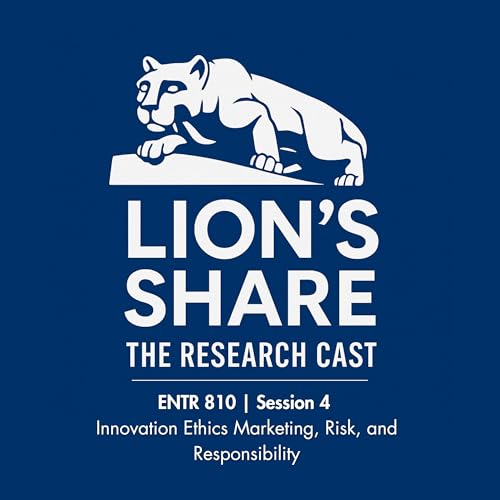
ENTR 810 | Session 4 | Innovation Ethics Marketing, Risk, and Responsibility
カートのアイテムが多すぎます
ご購入は五十タイトルがカートに入っている場合のみです。
カートに追加できませんでした。
しばらく経ってから再度お試しください。
ウィッシュリストに追加できませんでした。
しばらく経ってから再度お試しください。
ほしい物リストの削除に失敗しました。
しばらく経ってから再度お試しください。
ポッドキャストのフォローに失敗しました
ポッドキャストのフォロー解除に失敗しました
-
ナレーター:
-
著者:
このコンテンツについて
ENTR 810 | Session 4 | Innovation Ethics Marketing, Risk, and Responsibility
Introduction:
Will discuss the importance of integrating ethics into technological progress and business practices, especially regarding Artificial Intelligence (AI) and innovation. Organizations are increasingly dealing with challenges related to AI ethics and bias, which demand strong governance frameworks and platforms. These platforms are designed to promote responsible AI by managing its legal, ethical, and operational performance through monitoring aspects like robustness, transparency, fairness, accountability, and risk compliance. Rising public expectations for transparent AI, along with regulatory pressures and concerns about the potential negative impacts of advanced autonomous AI systems, emphasize the need for effective AI governance platforms. Such platforms include tools like responsible AI methods, risk assessments, model lifecycle management, and compliance tools to ensure AI systems reflect societal values and legal standards. For example, Lenovo describes a vision for "Smarter AI for All," committing to principles such as preventing harm, ensuring fairness, transparency, human oversight, privacy protection, and adherence to laws and regulations throughout the AI lifecycle. Beyond AI, the sources also explore broader themes of ethical leadership, innovation, and risk management. A key idea is that ethical leadership should focus on creating maximum value for society, moving beyond simple rules to consider overall well-being and reduce suffering. Cognitive barriers, called "bounded ethicality" or "motivated blindness," often prevent individuals from making ethical decisions, emphasizing the need for deliberate thinking rather than intuitive responses. Strategies for better ethical decision-making include comparing options, applying a "veil of ignorance" to eliminate self-interest, making value-based trade-offs, and wisely managing limited resources like time. Innovation itself is presented as an ethical activity, with each new product or business model carrying implications for stakeholders, leading to dilemmas over product safety, targeted marketing, and data use. The rapid modularization of technology value chains, exemplified by platforms like Facebook and 3D printing, can cause ethical responsibility to become diffused as traditional safeguards are bypassed. Therefore, companies are encouraged to proactively address ethical issues, take responsibility as standard-bearers, document current safeguards, and establish clear accountability to navigate these complex challenges. Furthermore, strict legal compliance alone is not enough; adopting new ethical paradigms is vital for long-term success and maintaining public trust. Companies like Lenovo also demonstrate comprehensive ethical practices, including anti-bribery measures, data privacy, fair competition, and fostering a culture of transparency for reporting concerns.
まだレビューはありません



